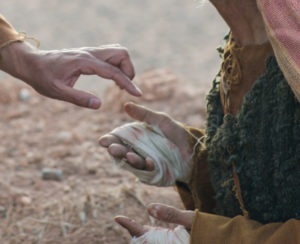 Jesus didn’t have to physically touch the leper to heal him. In Luke 7, he healed a centurion’s son from a distance. In John 4, Jesus second miracle was raising an official’s son 16 miles away. He didn’t need to be physically in the room to heal then. And he doesn’t need to be physically present to heal now.
Jesus didn’t have to physically touch the leper to heal him. In Luke 7, he healed a centurion’s son from a distance. In John 4, Jesus second miracle was raising an official’s son 16 miles away. He didn’t need to be physically in the room to heal then. And he doesn’t need to be physically present to heal now.
Many of us can tell stories about the power of Jesus healing someone. Was Jesus physically there when it happened? No, of course not. Jesus didn’t have to handle this leper to heal him either.
In fact, almost no one in his day would have touched this man. A cursory reading of the Law of Moses will show you the importance of being ceremonially clean. Only the pure could enter God’s presence. So there is a great emphasis on getting and staying clean. It wasn’t sinful to be unclean, just impurifying. A wait, a wash, and a sacrifice could restore ceremonial purity. Then they could be welcomed back into God’s presence.
But avoiding uncleanness in the first place was a huge part of being a faithful Jew. Even touching an unclean thing is enough to spread the uncleanness.
Haggai 2:11-14, 11 “This is what the Lord Almighty says: ‘Ask the priests what the law says: 12 If someone carries consecrated meat in the fold of their garment, and that fold touches some bread or stew, some wine, olive oil or other food, does it become consecrated?’”
The priests answered, “No.”
13 Then Haggai said, “If a person defiled by contact with a dead body touches one of these things, does it become defiled?”
“Yes,” the priests replied, “it becomes defiled.”
14 Then Haggai said, “‘So it is with this people and this nation in my sight,’ declares the Lord. ‘Whatever they do and whatever they offer there is defiled.”
That’s easy to understand. If we take an oily rag from the garage and plunked it down on the white table linens, no one is worried that the rag will get clean. Unless they could help it, faithful Jews wouldn’t touch dead things, unclean foods, certain bodily fluids, or (case in point) any diseased skin so that they could avoid being unclean.
But along came this leper who is walking, talking uncleanness and he asked Jesus to make him clean. A dirty rag from the garage asked the pure white linen for some cleanness.
Here’s where Jesus did the surprising thing: He reached out and touched the unclean man. The three parallel Gospel writers include different details from this even, but every account specifically mentions this (Matthew 8:3; Mark 1:40; Luke 5:13). Jesus the Clean touched the unclean leper.
Why? If he didn’t have to in order to heal him and touching an unclean thing would ordinarily spread uncleanness, then why?
Jesus didn’t come here to avoid our uncleanness, but to confront it. Contrary to common belief, God doesn’t recoil from sinners, he runs toward us. Our uncleanness makes us avoid him, not the other way around. We cannot make the Lord dirty, but he can make us clean. It is those who recognize this, who come to him for healing as this man did, who are touched and cleansed by Jesus.
He didn’t have to handle the leper, but he did. And because he did, we see contact with Jesus makes us clean.
Click here to listen to the message, Handled, Healed, and Hushed from Luke 5:12-16.
